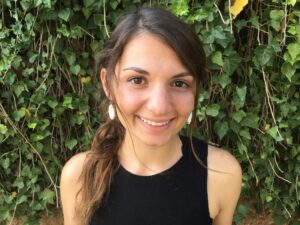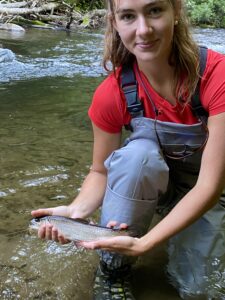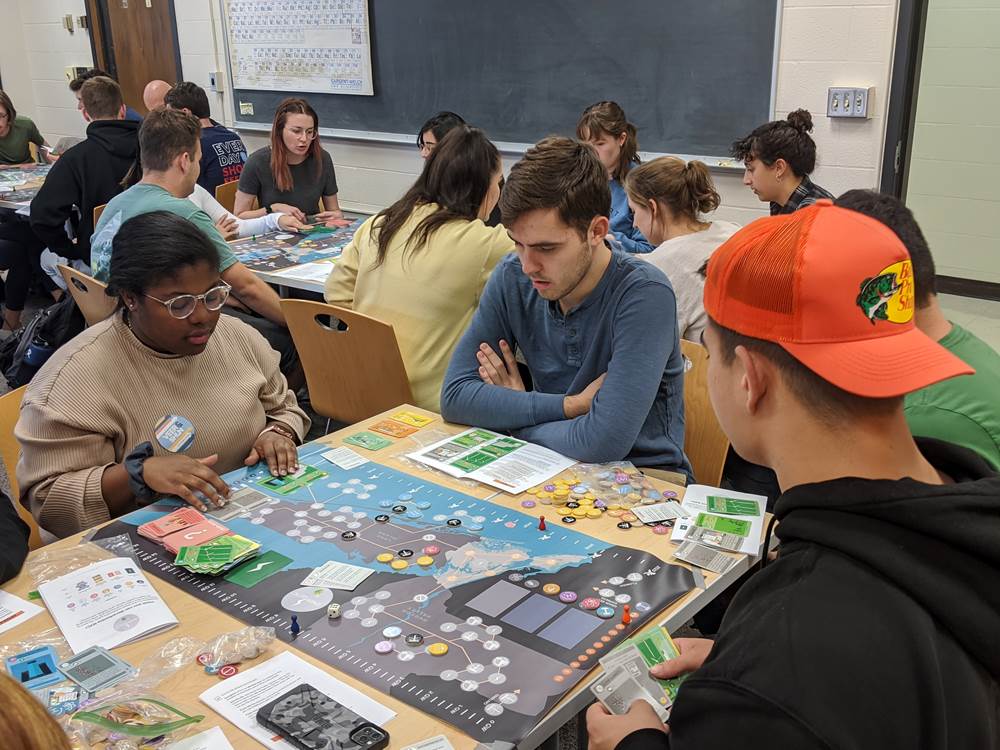Immersion and Internships
Immersion Is… an opportunity for undergraduate students to pursue their passions and interests through experiential learning. Each student takes a self-directed project from proposal to completion in and beyond the classroom with the guidance of a Vanderbilt faculty member. Immersion projects can include a wide range of experiences, including study abroad, internships, and research projects. Some Immersion experiences bridge actionable research and apply real world problem-solving.
Some students have completed Immersion projects with faculty guidance at The Wond’ry, Vanderbilt’s Innovation Hub. These take the form of two or three semesters in a design studio, where undergraduate students collaborate with each other, faculty, and communities on a range of projects aimed at advancing climate, energy, and health equity. Past projects have tasked students with developing conceptually new approaches to corporate and institutional decarbonization. Students have worked to create decarbonization approaches that generate economic, environmental, or health co-benefits for marginalized communities.
Immersion Stories
Liliana Capiola ’23
 Lily Capiola completed her Immersion experience with a research project on how climate change can affect common mental illnesses, among them anxiety, depression, post-traumatic stress disorder, and substance dependency. Although conventional treatments for these illnesses are effective, she also found that researchers are beginning to explore new types of interventions that specifically address climate change. For example, taking action on climate change reform and avoiding “doom-scrolling” can alleviate symptoms of climate anxiety.
Lily Capiola completed her Immersion experience with a research project on how climate change can affect common mental illnesses, among them anxiety, depression, post-traumatic stress disorder, and substance dependency. Although conventional treatments for these illnesses are effective, she also found that researchers are beginning to explore new types of interventions that specifically address climate change. For example, taking action on climate change reform and avoiding “doom-scrolling” can alleviate symptoms of climate anxiety.
Jenny stekardis ’23
 As an economics and medicine, health, and society double major, with an environmental and sustainability studies minor, Jenny Stekardis is passionate about using business to promote social and environmental change. For her Immersion project, she worked with the Coffee Equity Lab at the Wond’ry Social Ventures department to understand how sustainability can be promoted in the coffee sector. First, she attended the Fall 2020 Speaker Series to gain an introduction to the interdisciplinary coffee sector. Through these three, 90-minute seminars, she interacted with coffee professionals and learned about the causes and consequences of relevant issues like environmental damage. She enrolled in three relevant courses to deepen her knowledge, including classes in economics and African history. Finally, throughout the spring 2021 semester, she collaborated with fellow students and the Coffee Equity Lab to offer feasible solutions to coffee consumers in Nashville looking to support sustainability and social inclusion in their purchasing practices. Her group synthesized the information gained from the Coffee Speaker Series, relevant coursework, and interviews conducted with local cafe owners to develop an online Coffee Atlas. The Atlas is a computer program designed for Vanderbilt students that provides location, cost, and environmental impact details on ten sustainable coffee shops near Vanderbilt’s campus. After participating in this experience, Jenny hopes to continue developing sustainable supply chains through her career.
As an economics and medicine, health, and society double major, with an environmental and sustainability studies minor, Jenny Stekardis is passionate about using business to promote social and environmental change. For her Immersion project, she worked with the Coffee Equity Lab at the Wond’ry Social Ventures department to understand how sustainability can be promoted in the coffee sector. First, she attended the Fall 2020 Speaker Series to gain an introduction to the interdisciplinary coffee sector. Through these three, 90-minute seminars, she interacted with coffee professionals and learned about the causes and consequences of relevant issues like environmental damage. She enrolled in three relevant courses to deepen her knowledge, including classes in economics and African history. Finally, throughout the spring 2021 semester, she collaborated with fellow students and the Coffee Equity Lab to offer feasible solutions to coffee consumers in Nashville looking to support sustainability and social inclusion in their purchasing practices. Her group synthesized the information gained from the Coffee Speaker Series, relevant coursework, and interviews conducted with local cafe owners to develop an online Coffee Atlas. The Atlas is a computer program designed for Vanderbilt students that provides location, cost, and environmental impact details on ten sustainable coffee shops near Vanderbilt’s campus. After participating in this experience, Jenny hopes to continue developing sustainable supply chains through her career.
Internships
Various organizations offer paid summer canvassing internships, including the Public Interest Research Groups, Green Corps, and Environment America. Green Corps also offers placement for paid and unpaid summer positions with local environmental groups. The program’s director of undergraduate studies can provide a more complete overview of internship possibilities, both within and beyond Nashville.
Kristen Nutter ’23
 “I was a Business Development and Outreach intern with the Tennessee Environmental Council in summer 2021. The Tennessee Environmental Council (TEC) is a local nonprofit aimed at helping Tennessee residents improve the environment and become more aware of how our actions affect the surrounding ecology. The focus of the work was to improve volunteer numbers on several programs, including Tennessee Tree Day, the Pollinator Project, Restoration Events, and the Compost Community, with activities such as tree plantings, stream bank restoration, as well as pollinator and rain garden installations. I refined the plan and strategy for Tennessee Tree Day, their leading program, to assist in implementing new policies and to increase engagement in order to mobilize the planting of over 741,000 native trees in Tennessee and the surrounding states. I also processed and consolidated the data from Tennessee Tree Day through 2020 to 2021 to prepare for the Spring 2022 Tree Day event.”
“I was a Business Development and Outreach intern with the Tennessee Environmental Council in summer 2021. The Tennessee Environmental Council (TEC) is a local nonprofit aimed at helping Tennessee residents improve the environment and become more aware of how our actions affect the surrounding ecology. The focus of the work was to improve volunteer numbers on several programs, including Tennessee Tree Day, the Pollinator Project, Restoration Events, and the Compost Community, with activities such as tree plantings, stream bank restoration, as well as pollinator and rain garden installations. I refined the plan and strategy for Tennessee Tree Day, their leading program, to assist in implementing new policies and to increase engagement in order to mobilize the planting of over 741,000 native trees in Tennessee and the surrounding states. I also processed and consolidated the data from Tennessee Tree Day through 2020 to 2021 to prepare for the Spring 2022 Tree Day event.”
Charlotte JAmes ’24
 “I worked for the Georgia Sea Grant and UGA Marine Extension Summer as a Coastal Resilience intern in summer 2021. Working under Dr. Jill Gambill, I gained practical experience in coastal resilience to flooding, sea-level rise, and storm surge. I was also a member of the National Fish and Wildlife Foundation funded Tybee Back River Study team developing innovative solutions to coastal resilience, where we conducted focus groups for a residential flood resilience survey to gather public input. We developed a set of gray, green, and hybrid infrastructure recommendations including living shorelines, levees, culverts, sea walls, and increased recreational greenspace. I created content for the project website, presentation graphics, and Tybee Island ArcGIS Storymap. I also interned at the Carnegie Museum of Natural History as a research intern in the Amphibians and Reptiles Section with Curator Dr. Jennifer Sheridan. I conducted field and collections-based research on the impact of climate change on habitat alteration and organism size. This work included specimen collection, measurement, data input and analysis.”
“I worked for the Georgia Sea Grant and UGA Marine Extension Summer as a Coastal Resilience intern in summer 2021. Working under Dr. Jill Gambill, I gained practical experience in coastal resilience to flooding, sea-level rise, and storm surge. I was also a member of the National Fish and Wildlife Foundation funded Tybee Back River Study team developing innovative solutions to coastal resilience, where we conducted focus groups for a residential flood resilience survey to gather public input. We developed a set of gray, green, and hybrid infrastructure recommendations including living shorelines, levees, culverts, sea walls, and increased recreational greenspace. I created content for the project website, presentation graphics, and Tybee Island ArcGIS Storymap. I also interned at the Carnegie Museum of Natural History as a research intern in the Amphibians and Reptiles Section with Curator Dr. Jennifer Sheridan. I conducted field and collections-based research on the impact of climate change on habitat alteration and organism size. This work included specimen collection, measurement, data input and analysis.”
